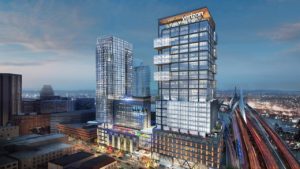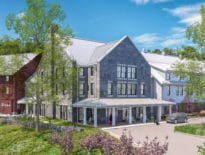
Verizon is the anchor tenant of the office tower rising above the TD Garden at Boston Properties’ 1.8-million-square-foot mixed-use development known as The Hub on Causeway. Image courtesy of Delaware North
After decades of living in the shadows of busier, techier and hipper districts, Boston’s North Station is finally coming into its own.
The transformation of the North Station market – the area around Causeway and Merrimac streets, extending as far as Massachusetts General Hospital to the west and TD Garden to the north – is very much under way. While it hasn’t been heralded with dozens of cranes and shiny new glass towers as in the Seaport, it’s happening. And the consequences of this revitalized area will have an enormous lasting impact on development and real estate in Boston.
The best-kept secret in the city right now is just how many companies – both dynamic startups and established mainstays – have set up offices or headquarters in this area. The arrival of Converse made a splash when it moved its global headquarters to North Station in 2017. State Street made headlines when it announced its headquarters would move to the $1 billion One Congress tower, which has just begun construction and will be the tallest office building to rise in Boston in 25 years. Rapid 7’s decision to move this year to the area from 100 Summer St. was similarly head-turning, as it provided Boston Properties and Delaware North an anchor tenant for The Hub on Causeway mega-development.
Lower Rents Lure Office Tenants
The Hub itself is a testament to the new North Station: comprised of 1.8 million square feet of office, retail, hotel and residential uses on the site of the old Boston Garden along Causeway Street, it is a project that would have seemed inconceivable to observers of this neighborhood 20 years ago. Still under construction, it already shows enough promise that telecommunications behemoth Verizon chose The Hub – not the Seaport, Financial District or Kendall Square – to house its 440,000-square-foot corporate expansion.
Dozens of other firms have followed in Verizon’s wake, enticed by lower costs per square foot (for now) and proximity to Kendall Square that the Seaport cannot match. The end result is a level of commerce and economic vitality previously unheard of for the neighborhood. Where previously the area was a more affordable location for service-related firms like engineers, it now features dynamic companies engaged in rapid expansion and record growth. And as they staff up, they are seeking office space nearby to accommodate their exploding workforce.
Fortunately for them, the region’s residential capacity is growing to match. Top-tier residential towers, like the recently opened 38-story Avalon North Station and the soon-to-open Hub50House at The Hub on Causeway, provide ultra-modern amenities for new employees who want to walk to work. Equity Residential is replacing the Garden Garage parking facility with a 44-story, 469-unit residential apartment tower with more than 20,000 square feet of resident amenities. And everywhere, existing housing stock is being renovated to meet the higher expectations of a workforce being courted by some of the biggest names in their industries.
A Changing Nightlife Scene
These changes, both commercial and residential, are the contributing factors to another transformation that is still underway – the arrival of North Station as a true cultural hotspot.
The area’s nightlife has a character all its own. Traditionally not a spot with nightlife besides the hot sports scene and fans flowing in and out of TD Garden, the new workers and residents are enabling more experimental restaurants, bars and nightclubs to find a foothold in the community as well. It has always been fun to hang around Causeway Street, but now it’s cool.

John Boyle
Underlying all the changes to the Bullfinch Triangle area is the simple fact that, even when it was an afterthought to most, it has always been an authentic neighborhood. There is no pretension here, even among the glittering new towers and wing-and-a-prayer startups. North Station has a unique aesthetic and vibe that shines through even with all the changes that have taken place under everyone’s nose, and for that reason, it will continue to draw newcomers to its streets for years to come.
Boston Properties’ Bryan Koop has described North Station’s appeal this way: “The future will be all about transportation and experience. The knowledge worker demands the best access and authenticity. North Station has both.”
The challenge for those of us in the real estate industry should be to make the most of this new chapter in the neighborhood’s history while figuring out where the next North Station story will arise.
John Boyle is vice chair of Cushman & Wakefield.




 |
| 
